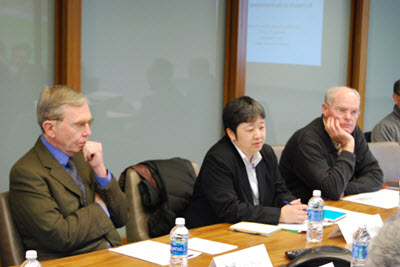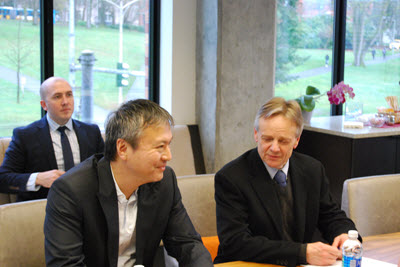Contact
China’s One Belt, One Road Initiative and Its Impacts on the International Order
On February 27, 2017, NBR’s Kenneth B. and Anne H.H. Pyle Center for Northeast Asian Studies convened a select group of academic, government, and business leaders to discuss the strategic implications of China’s “One Belt, One Road” (OBOR) initiative. This roundtable discussion addressed the potential impact of China’s OBOR initiative on U.S. and Japanese interests in Eurasia.
Agenda
INTRODUCTION
Richard J. Ellings, President, The National Bureau of Asian Research
PRESENTATION: China’s “One Belt, One Road” and Its Impacts on the International Order
Shino Watanabe , Associate Professor of International Relations, Sophia University
COMMENTARY
Nadège Rolland, Senior Fellow, The National Bureau of Asian Research
CONCLUDING REMARKS
Kenneth B. Pyle, Professor of History, University of Washington
Presenter Bios
Shino Watanabe is Associate Professor, Faculty of Global Studies, at Sophia University, Tokyo. Dr. Watanabe is a graduate of the Faculty of Economics, University of Tokyo, she received her MA in Law and Diplomacy from the Fletcher School, Tufts University, and earned her PhD in Foreign Affairs from the Woodrow Wilson Department of Politics, University of Virginia. She also served as a security studies fellow for the Research Institute for Peace and Security–Center for Global Partnership at the Japan Foundation and as a research fellow at the Japan Institute of International Affairs, Tokyo.
Nadège Rolland is Senior Fellow, Political and Security Affairs, at the National Bureau of Asian Research. Ms. Rolland served as desk officer for China and adviser on Northeast Asia in the French Ministry of Defense’s Directorate for Strategic Affairs. Ms. Rolland was previously a research analyst in the China Program at the S. Rajaratnam School of International Studies (RSIS) and a senior analyst of Asia-Pacific affairs at the French Defense Ministry’s Directorate for Strategy. Ms. Rolland holds an MS in Strategic Studies from RSIS and a Diplôme Supérieur on Contemporary Asia from the National Institute of Oriental Languages and Civilizations in Paris.

Left to right: Professor Pyle, Dr. Watanabe, and attendee Bill McCahill (NBR).

Left to right: Attendee John Donovan (Joint Base Lewis-McChord), NBR board member Ryo Kubota (Acucela), and NBR president Rich Ellings.



